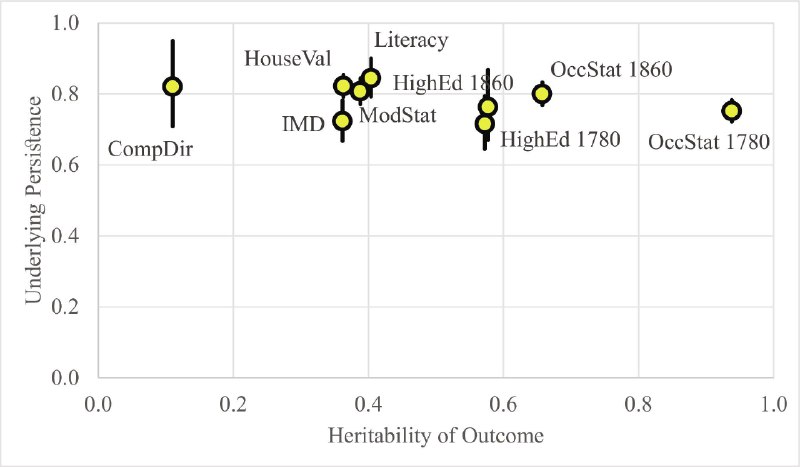group-telegram.com/thechadpastoralist/3003
Last Update:
What you do and who you are
We are shaped by our ancestors and what we do today is partly because of them, as shown by this study on the inheritance of social status in England from 1600 to 2022. It should be noted, however, that there was a certain degree of mobility amongst the gentry specifically between 1700 to 1900.
Younger sons of gentry families occupied unstable positions due to the primogenture system which dictated that the oldest son of the family would inherit the majority of status and wealth. This often meant that younger gentlemen had to take apprenticeships, establish businesses, and face the prospect of a landless existence in adulthood.
In 1726, John Buxton remarked that now that his ten-year-old younger son George had gone to school, 'he will now begin to think he is born for some employment, and that he must by industry and study endeavour to qualifie himself.'
In the late 18th century, being self sufficient as a gentleman (I.e., not being reliant on a salary to sustain oneself and family) and having financial autonomy to provide for one's family was seen as an aspect of a gentleman's masculine duty. For younger sons of the gentry, who faced a landless future, creating a business or taking up an apprenticeship became a means of achieving the financial autonomy that was traditionally secured through inheritance.
For example, in 1711, Thomas Huddlestone, an Englishman in Italy, wrote to his mother saying that he feared being dependent on a salary to sustain himself as opposed to establishing himself as a successful merchant:
'If after all I must end my days in servitude, why was I ever flatt'd in hopes of becoming a man by merchandising if I must never set up business… if once a man is sallaried here by another it is an eternal discredit to him and disables him for ever from setting up of himself or making his fortune… if I once serve for a salary I shall be no more look'd upon by either Merchant or Gentleman, but be rekon'd amongst the rascally fellows of the town.'
Many gentlemen at the time were concerned that their financial, behavioral, and moral autonomy was diminished by being 'subservient' to a master during their apprenticeship. Another concern was that the honour and status of gentleman was reduced or extinguished in the context of apprenticeship or employment.
In The Cities' Advocate in this Case or Question of Honor and Armes: Whether Apprenticeship extinguisheth Gentry? With a clear Refutation of the pernicious Error that it doth by Edmund Bolton in 1674, he explains why gentility is not extinguishable by servitude or apprenticeship, for it is derived from one's ancestors. Moreover, Bolton describes how a gentleman's honour is not diminished given the context of 'servitude' to a master.
The premise of the aforementioned context establishes the fact that our class and character are inherited, not produced by chance under a given circumstance.
In relation to an even earlier example in history, Laxdœla Saga recounts how Hǫskuldr purchased a silent slave woman named Melkorka from a Rus merchant. Initially, Melkorka pretended to be mute, but later revealed her true identity to Hǫskuldr as the daughter of King Myrkjartan of Ireland. Hǫskuldr and Melkorka have a son called Óláfr Pái (Olaf the Peacock).
When Óláfr was growing up, he believed his maternal ancestry to be shameful because his mother was a thrall, but when he realised that his mother was actually an Irish queen only reduced to slavery, he viewed that side of his ancestry with pride. Later in the saga, Óláfr decided to journey to Ireland to meet his maternal grandfather, King Myrkjartan.
This example from Laxdœla Saga shows us that having a degree of pride in our ancestry is inherently good. It also indicates that what someone does in modernity does not define who they are within historical class systems and isn't necessarily a reflection of the deeper essence of their soul.
BY The Chad Pastoralist: History

Share with your friend now:
group-telegram.com/thechadpastoralist/3003
